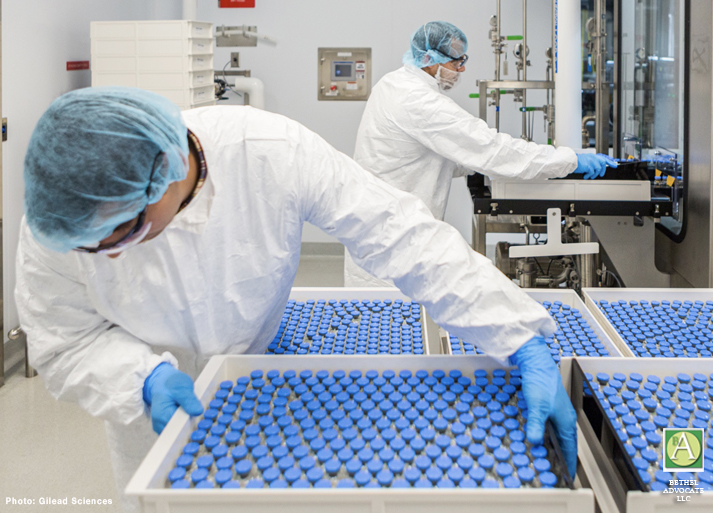
Report by Paula Antolini, Aril 30,2020, 6:48PM EDT

*****
Gilead Announces Results From Phase 3 Trial of Investigational Antiviral Remdesivir in Patients With Severe COVID-19
— Study Demonstrates Similar Efficacy with 5- and 10-Day Dosing Durations of Remdesivir —
“FOSTER CITY, Calif.–(BUSINESS WIRE)–Apr. 29, 2020– Gilead Sciences, Inc. (Nasdaq: GILD) today announced topline results from the open-label, Phase 3 SIMPLE trial evaluating 5-day and 10-day dosing durations of the investigational antiviral remdesivir in hospitalized patients with severe manifestations of COVID-19 disease. The study demonstrated that patients receiving a 10-day treatment course of remdesivir achieved similar improvement in clinical status compared with those taking a 5-day treatment course (Odds Ratio: 0.75 [95% CI 0.51 – 1.12] on Day 14). No new safety signals were identified with remdesivir across either treatment group. Gilead plans to submit the full data for publication in a peer-reviewed journal in the coming weeks.”
“Unlike traditional drug development, we are attempting to evaluate an investigational agent alongside an evolving global pandemic. Multiple concurrent studies are helping inform whether remdesivir is a safe and effective treatment for COVID-19 and how to best utilize the drug,” said Merdad Parsey, MD, PhD, Chief Medical Officer, Gilead Sciences. “These study results complement data from the placebo-controlled study of remdesivir conducted by the National Institute for Allergy and Infectious Diseases and help to determine the optimal duration of treatment with remdesivir. The study demonstrates the potential for some patients to be treated with a 5-day regimen, which could significantly expand the number of patients who could be treated with our current supply of remdesivir. This is particularly important in the setting of a pandemic, to help hospitals and healthcare workers treat more patients in urgent need of care.”
Remdesivir is not yet licensed or approved anywhere globally and has not yet been demonstrated to be safe or effective for the treatment of COVID-19. This study sought to determine whether a shorter, 5-day course of remdesivir would achieve similar efficacy results as the 10-day treatment regimen used in multiple ongoing studies of remdesivir. Secondary objectives included rates of adverse events and additional measures of clinical response in both treatment groups. Patients were required to have evidence of pneumonia and reduced oxygen levels that did not require mechanical ventilation at the time of study entry. Clinical improvement was defined as an improvement of two or more points from baseline on a predefined seven-point scale, ranging from hospital discharge to increasing levels of oxygen support to death. Patients achieved clinical recovery if they no longer required oxygen support and medical care or were discharged from the hospital.
Read more about the full study here.
*****
An Open Letter from the Chairman & CEO of Gilead Sciences, Daniel O’Day – April 29, 2020:
“Over the past two months we all have been waiting in hopeful anticipation for the science to speak on remdesivir. While there were clues along the way, we knew that only clinical trials could provide the answers on whether it is a safe and effective treatment for COVID-19. Today we have some initial answers.
“The results from the global, placebo-controlled trial run by the National Institute of Allergy and Infectious Diseases (NIAID) are positive. They show that patients with COVID-19 who received remdesivir recovered faster than similar patients who received placebo.
“There is still more work to do and remdesivir has not been approved, but all of us at Gilead are humbled by what these promising results might mean for patients. After years of research and hard work on remdesivir, there is relief and gratitude among our teams today that their efforts have been so worthwhile.
“This work started long before we knew about the outbreak of COVID-19. Remdesivir is the result of more than a decade of research, experimentation and iteration by Gilead scientists. In recent years, we have been studying its impact in hemorrhagic fever viruses such as Ebola, Marburg and Nipah viruses as well as other coronaviruses such as SARS and MERS. We had built up sufficient knowledge so that when the novel coronavirus emerged, we could move very quickly into clinical trials.
“Since January, our teams have been working day and night to determine whether remdesivir might work in patients with COVID-19. These efforts include collaboration with study investigators and governments on the various clinical trials. Today’s news, that remdesivir might play a role in easing the burden of the pandemic, is the outcome we all hoped would be possible.
“Today’s results in context
“The NIAID study is part of a suite of clinical trials to investigate the effects of remdesivir. When we designed the overall clinical program, we did so in such a way that we could ask multiple questions in parallel, including which groups of patients are most likely to respond, when to treat and for how long. Various study designs were used from placebo-controlled to open-label to answer very specific questions in each case. We expected that the answers would emerge around the same time and that, taken together, they would form a clear picture of how remdesivir might best be used for patients.
“Today, in addition to the NIAID data on safety and efficacy, we also have data regarding duration of treatment from the Gilead-sponsored Phase 3 SIMPLE trial in patients with severe COVID-19 disease. The question of duration is important because the possibility of a shorter treatment course is beneficial in many respects. Patients can return home earlier from the hospital, families can be reunited, healthcare resources are freed up and more medicine is available for other patients in need. In a time of pandemic, all of this becomes especially significant.
“The SIMPLE clinical trials have been evaluating whether five days of treatment with remdesivir would result in the same outcomes as 10 days. The data from the first study showed similar clinical improvements in patients with severe symptoms of COVID-19, regardless of whether they received five or 10 days of treatment. We are very pleased with these results. They provide valuable information on treatment duration in this severe patient population and show the outcome we had all hoped to see.
“This outcome has positive implications for our supply of remdesivir. Our teams have been ramping up production since January, working within all the constraints that come with such a lengthy and complex manufacturing process. Our existing supply, including finished product ready for distribution as well as materials in the final stages of production, amounts to 1.5 million individual doses. We had estimated that this would be 140,000 treatment courses based on a 10-day treatment duration. The ability to shorten duration for severely ill patients means we can significantly increase the number of courses available, all of which Gilead has committed for donation.
“From the two sets of results today – the NIAID and SIMPLE data – we now know two things: that remdesivir appears to shorten time to recovery and when treating patients with severe disease, a five-day treatment course is potentially as effective as 10 days.
“The path forward
“The story of remdesivir always has been one of collaboration and letting the science speak and these will continue to shape our approach.
“Today’s results open up many opportunities to explore the utility and potential of remdesivir. Our teams will look at ways to potentially bring the treatment to a broader patient population by investigating other formulations and means of delivery. We will also engage with partners to explore how remdesivir might work with other therapies.
“On the supply side, we are working to build a global consortium of pharmaceutical and chemical manufacturers to expand global capacity and production. It will be essential for countries to work together to create enough supply for people all over the world and we look forward to these collaborative efforts. In the event of regulatory action, we are in discussions with various groups about how we might bring remdesivir to the developing world.
“Thank you to everyone who has helped to bring us this far with remdesivir – from the patients involved in clinical trials to healthcare workers, study investigators and many other groups. We know that there is still a lot of work to be done and a long way to go in finding medical solutions to stop the pandemic. At the same time, today’s news on remdesivir represents important progress and offers hope at a time when it is badly needed.
###
